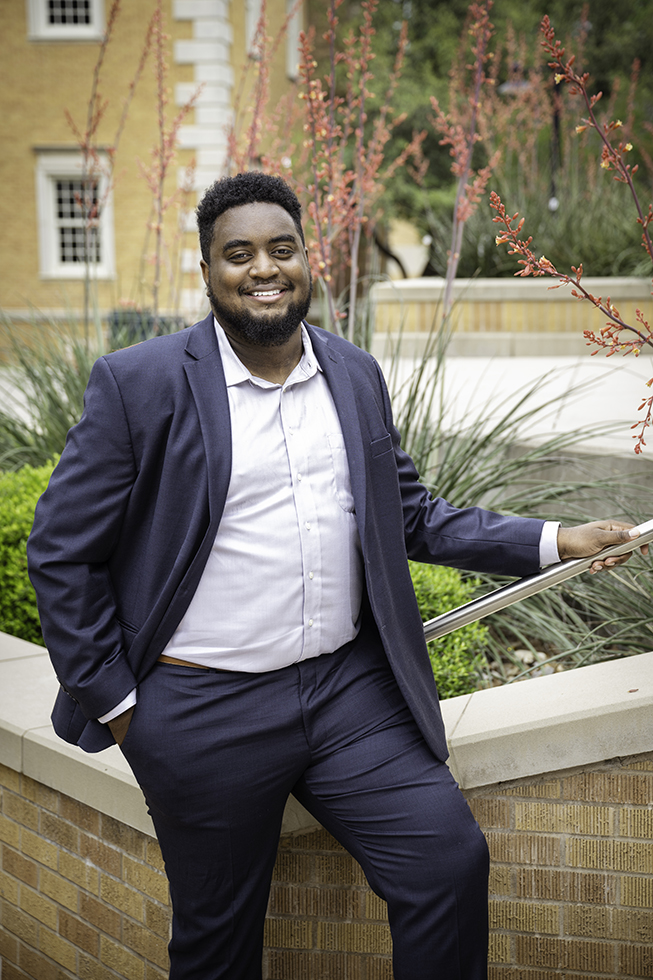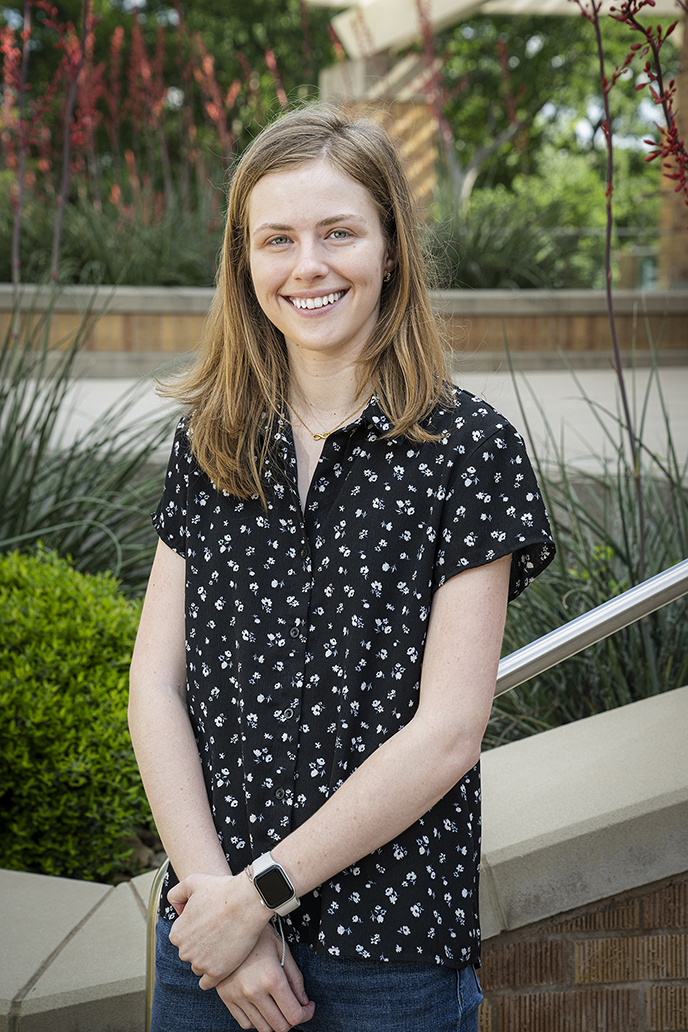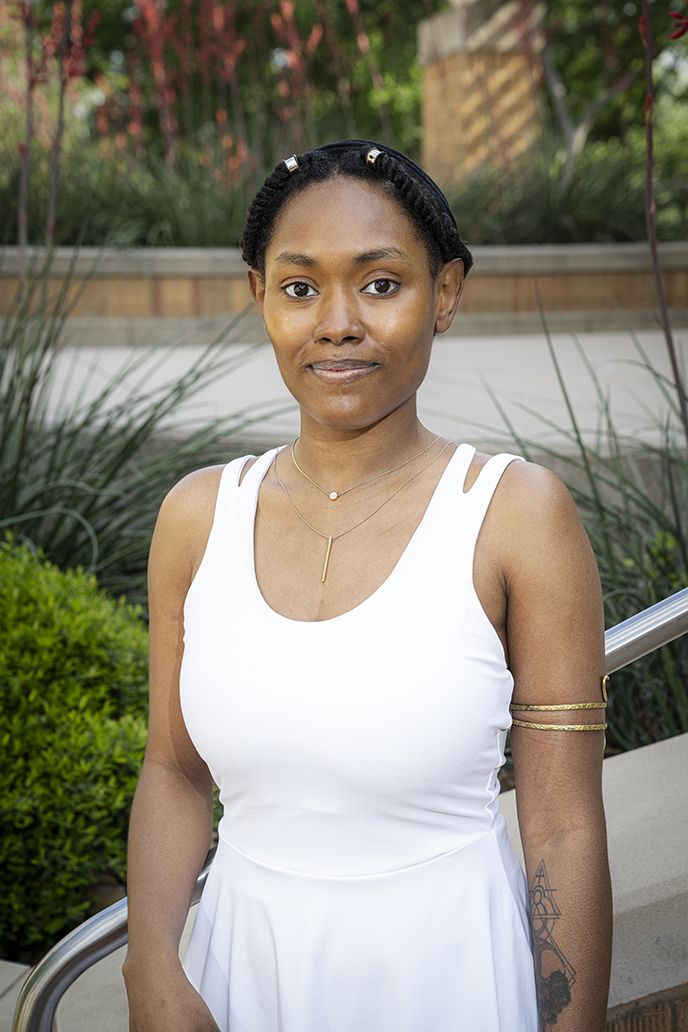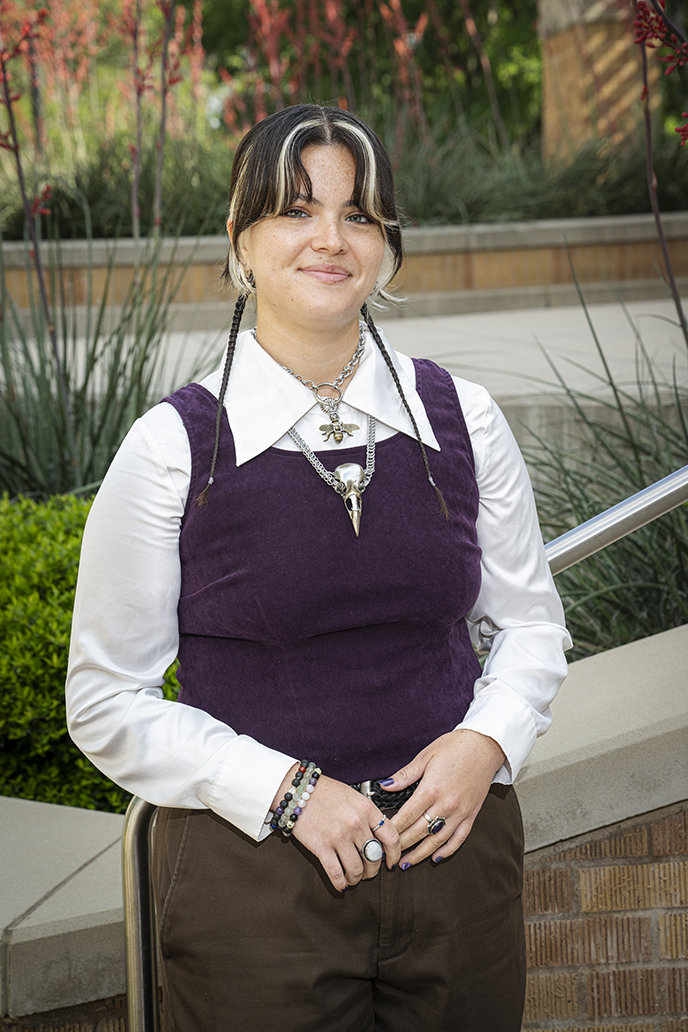Four researchers from the University of North Texas have earned one of the most competitive research awards in the U.S. for graduate students.
The U.S. National Science Foundation’s Graduate Research Fellowship funds full tuition for the recipient’s research-based graduate degree, includes an annual $37,000 stipend for three years and provides access to networking and professional development from the NSF.
Among this year’s fellows are UNT students Sydney Fields and Ernest “Will” Cubit II (’22) in the College of Engineering as well as Kristina Fite and lab manager Marie Muñiz (‘23) in the College of Science.
“Earning this fellowship is a tremendous accomplishment,” says Pamela Padilla, UNT’s vice president of research and innovation. “I am proud to celebrate these UNT staff and students as they work to further research within their fields and help shape the future STEM workforce.”
Ernest 'Will' Cubit II

Ernest “Will” Cubit II combines his two interests with his research — artificial intelligence and materials science. Cubit first studied materials science at UNT while earning his bachelor’s degree. Now, he’s pursuing a Master of Science in artificial intelligence, which in Fall 2020 debuted as the first degree program of its kind in Texas.
With his research, Cubit hopes to leverage AI to enhance industry alloys and to further knowledge in materials science. He’s currently working on a project funded by the U.S. Army Research Laboratory using AI and large language models to discover stronger and tougher metal alloys. Mark Albert, an associate professor in biomedical engineering and materials science and engineering at UNT, asked Cubit to join thanks to his dual expertise.
“Will is a great example of a graduate student forming the glue of a collaboration between AI expertise and domain experts like in materials science,” Albert says. “Give him a high-level goal, and he makes it happen.”
For Cubit, earning this award is a highlight of his time at UNT.
“Before I transferred to UNT, I was at a pretty low point. I needed to get a better feeling on my life. Coming to UNT allowed me to be closer to home. To recover in the way I did with the support of the department and my family really was a big deal for me,” Cubit says. “I still can’t believe it. I’m so thankful.”
Cubit will spend his NSF fellowship at Stanford University. He plans to keep using AI in materials science to help speed up the process of alloy discovery with the goal of creating better and faster technology, such as engines for planes and vehicles.
Sydney Fields

Doctoral student Sydney Fields studies additive manufacturing in the materials science and engineering department. Her research will contribute to the creation of aircraft using additive-manufactured or 3D-printed titanium alloys.
Fields began researching 3D-printed alloys three years ago as an undergrad after being introduced to it by her advisor, Yufeng Zheng, an associate professor of materials science and engineering. She jumped right into researching advanced electron microscopy, something she says many undergraduates don’t get the opportunity to study. Electron microscopes differ from traditional microscopes by using an electron beam instead of glass lenses to study a specimen’s structure and composition.
“As her faculty advisor, I have had the privilege of witnessing her remarkable growth as both a student and a researcher in metal additive manufacturing and electron microscopy,” Zheng says. “I have no doubt that Sydney will inspire younger generations of students.”
Thanks to the opportunity, Fields was able to attend conferences, such as one with The Minerals, Metals and Materials Society, and collaborate with student researchers at other universities to gain more insight into the field.
With her NSF fellowship, Fields will continue to research titanium alloys at UNT and help advance knowledge about titanium additive manufacturing.
“I would like to see more additive manufactured aircraft structures and engines in the future,” Fields says. “With additive manufacturing, we can decrease product waste, increase fuel efficiency and help the environment.”
Kristina Fite

Master’s student Kristina Fite Studies aquatic ecotoxicology and amphibian conservation. She is investigating the potential harmful effects of the chemical 6PPD that’s often used as a stabilizing additive in rubbers, with its most prevalent application being what gives car tires their durability. She’s also looking at the byproduct of that chemical when it reacts with the ozone, 6PPD(Q).
“These chemicals have recently been shown to harm Coho salmon, so we want to determine what other aquatic species they might impact,” says Fite, who is performing her research under the guidance of UNT’s Jason Bohenek, clinical assistant professor of biological sciences.
Bohenek, who specializes in aquatic community ecology and is affiliated with UNT’s Advanced Environmental Research Institute, says Fite first impressed him during her undergraduate study at The Ohio State University, where he was working as a postdoctoral researcher at the time.
“Her undergraduate research project looked at the effects of light pollution on mosquito oviposition and was truly outstanding,” Bohenek says. “Working alongside Kristina has been a privilege, and I look forward to seeing her continue to excel in the future.”
With the NSF fellowship, Fite will continue pursuing her master’s degree in biology at UNT and carry out her full-scale research project to understand more about 6PPD and 6PPD(Q) and their impact on the environment. The work will especially focus on the chemicals’ effect on developing amphibian larvae.
“Without this funding, I would have been very limited with my research. Now, I can contribute in a more meaningful way to the data that’s out there on these chemicals and possibly inform regulation and its use in the future,” Fite says.
Fite’s ultimate goal is to work with an endangered animal population and support repopulation of a species.
“I feel like by understanding how we think and interact with the environment, I can help create conservation or sustainability,” Fite says.
Marie Muñiz

Marie Muñiz dove into research during her first semester as an undergraduate ecology major, taking the introductory course in the UNT Phage Hunters Advancing Genomics and Evolutionary Science (PHAGES) program taught by microbiology associate professor Lee Hughes. Then, after noticing an uptick in dead birds on campus, she found inspiration for her next project — a study monitoring bird-window collisions on the UNT Denton campus. The research eventually led to her helping found the UNT Bird Campus Committee, a student-led committee funded by UNT’s We Mean Green Fund, whose goal is to shed light on birds’ important role in the ecosystem and provide conservation education.
However, her work in assistant professor and pollinator expert Elinor Lichtenberg’s lab is what has fueled her research interest in bees and career aspirations to become a conservation ecologist.
“Pollinator populations are declining, which is what makes understanding their behavior so important,” says Muñiz, who has been working as a manager in Lichtenberg’s lab after earning her bachelor’s degree in Spring 2023. “If we can know more about how humans affect them, we can figure out ways we can promote and help our native pollinator populations.”
Her undergraduate Honors College thesis explored how bees make foraging decisions using social information from diverse flower visiting insects. Next up, Muñiz plans to build on her research by examining what effect pesticides and rising global temperatures can have on bumble bee behavior at Penn State University, where she will use her NSF fellowship to earn a master’s degree in entomology.
“Marie is self-motivated in her growth as a scientist. She has a strong interest in conservation research and has made numerous contributions to her fellow students and community,” Lichtenberg says. “She will be greatly missed at UNT, but I am so excited to see her career journey unfold.”